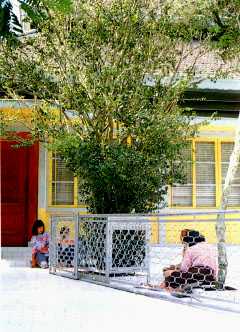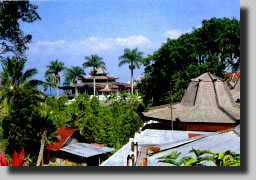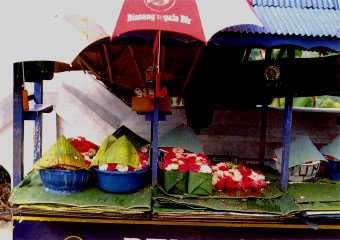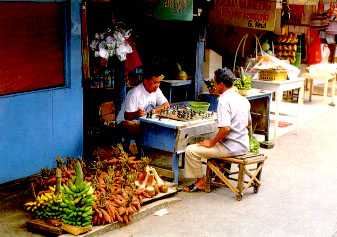
GUNUNG KAWI
  Following
a period of instability and upheaval, much of East Java was re-united
in the 11th century by King Airlangga, one of Indonesia's most
popular historical figures. Before he died, however, the king
decided to split his realm between two of his sons, in order
to avoid any future disputes over succession. According to legend,
the person responsible for implementing the decision was the
holy sage Mpu Bharada. The official border separating the two
portions of the kingdom was to be a line running north south
through the middle of Mt Kawi, north west of Malang. Following
a period of instability and upheaval, much of East Java was re-united
in the 11th century by King Airlangga, one of Indonesia's most
popular historical figures. Before he died, however, the king
decided to split his realm between two of his sons, in order
to avoid any future disputes over succession. According to legend,
the person responsible for implementing the decision was the
holy sage Mpu Bharada. The official border separating the two
portions of the kingdom was to be a line running north south
through the middle of Mt Kawi, north west of Malang.
The story goes that, as Mpu Bharada was crossing the mountain
his robe became entangled in a small, thorny tree. In anger,
the sage uttered a curse to the effect that the tree would never
grow any larger and would remain a dwarf. Visitors to Mt Kawi
today can still see this 'dwarf tree', which is located in the
grounds of a sacred tomb. Surrounded by a fence, the tree bears
a local fruit known as dewan daru. Pilgrims to the tomb can often
be seen sitting beneath the tree, in the hope of picking up a
leaf freshly blown off by the wind, which is believed to bring
good fortune. Whether or not the legend is true, the tree is
indeed a dwarf and residents of Mt Kawi insist that it has remained
the same size for as long as anyone can remember.
Gunung (Mt) Kawi is another of Java's sacred mountains, attracting
a steady stream of visitors from all over Indonesia and even
further afield. The focus of attention is the tomb of two revered
historical figures; Kandjeng Panembahan Djoego, a descendant
from the court of Mataram and grandson of the famous rebel leader
Prince Diponegoro, and Raden Mas Iman Soedjono, descending from
the royal family of Yogyakarta. The dates of their respective
deaths are 1871 and 1876 A.D.
Mt Kawi is especially popular among the Indonesian Chinese community
and the village which has grown up around the pilgrimage site
displays a unique blend of Javanese and Chinese cultures. On
the one hand, traditional Javanese performances, such as wayang
kulit (the shadow play) are often staged here, while at the same
time there are Chinese fortune tellers and small shops selling
Chinese candles, incense and various handicrafts. Auspicious
times for visiting Mt Kawi are, according to the Javanese calendar,
Jumat Legi and Senin Paing (every fifth Monday and Friday)
Offering
for sale
 |
|
Chess
Player
 |
|
|
